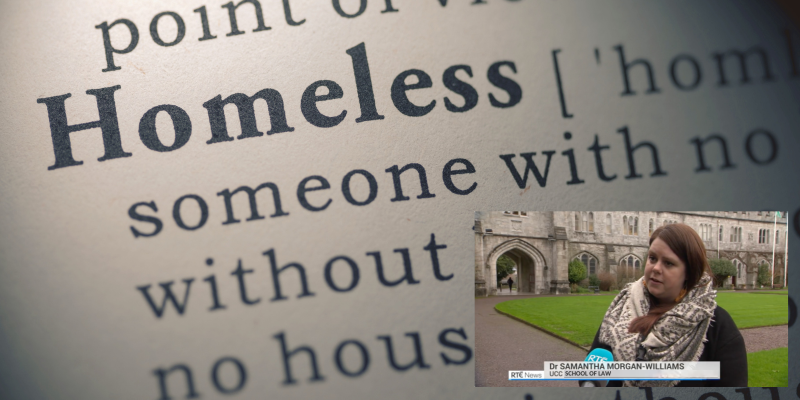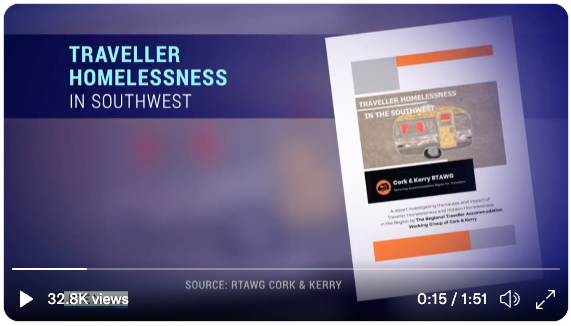Traveller Homelessness and ‘Hidden Homelessness’: A Discussion of the Recent Report Released by the Cork and Kerry Regional Traveller Accommodation Working Group.

Ireland is in the midst of a severe and prolonged housing crisis which has affected every facet of society. However, the effects of this general housing crisis upon the provision and supply of Traveller accommodation has reached critical levels.
This is the opening sentence of the recently released report ‘Traveller Homelessness in the South-West' authored by Dr. Samantha Morgan-Williams of the Traveller Equality and Justice Project. The report published by the Cork and Kerry Regional Accommodation Working Group investigated the causes and impact of Traveller Homelessness and hidden homelessness within the region. The conclusions drawn from this report make clear that 'the homelessness crisis facing Travellers is compounded by […] systemic discriminatory policies and implementation gap.'
Core Findings
The report highlights the causes and impact of hidden homeless on the Traveller Community in the Southwest of Munster (Cork City, Cork County & Kerry) using data collected in Spring/Summer 2018. This report is presented by the Cork Kerry Regional Traveller Accommodation Working Group (RTAWG) to highlight the ongoing and proliferating effects of the housing crisis on Travellers experiencing homelessness in the South-West.
In providing an overview of the current structures in place for providing Traveller-specific accommodation, the report explores the causes of the generalised Traveller accommodation crisis and analyses the way this has created worryingly high levels of homelessness amongst the Traveller Community.
The report highlights in particular how the current legislative definition of homelessness used in Ireland is inadequate, as it is ‘failing to include the full scope of ways by which many currently find themselves homeless’ by only classifying those rough-sleeping or in emergency accommodation as homeless. Only those experiencing this narrow definition of homelessness are counted in the Government’s Homelessness Count statistics. This causes people who are ‘doubling up, sharing accommodation, staying with friends or family and sleeping in cars’ to be ‘statistically hidden’ or ‘hidden homeless.’
In discussing the proliferating numbers of Travellers experiencing hidden homelessness, the report recognises factors that may push individuals and families into homelessness:
[D]ecades of insufficient and weak policies aiming to provide Traveller accommodation have been further weakened by a lack of political will and financial support to provide Traveller-specific accommodation options.
Other homelessness-causing factors that are outlined include:
- Evictions from private renting.
- Evictions by the Local Authority if they determine that there is too much overcrowding in a particular residence or family unit.
- Inability to secure private rented accommodation.
- Lack of culturally appropriate accommodation, worsened by a consistent underspend from the budget allocated to Traveller accommodation across Ireland. From the period 2008 to 2017, local authorities were allocated €157 million for Traveller accommodation but failed to spend €52m.
- Barriers to accessing the ‘Choice Based Letting system’.
- Failures in the algorithmic ‘Choice Based Letting system’ to weigh factors other than years spent on the waiting list. This has resulted in a complaint to the Workplace Relations Commission which resulted in the Cork City Council having to review the CBL system.
Further factors that are not unique to the Traveller Community include: ‘addictions, relationship breakdown, domestic violence, people being released from prison, stigma associated with coming out as LGBT and mental health issues’.
Unfortunately, in excluding hidden homelessness, the statistics obscure the reality of homelessness and accommodation conditions within the Traveller Community and fail to recognise that those having to live in overcrowded and highly unsuitable conditions are in fact homeless.
This is worsened by the discrimination which Travellers face in the private rental market. According to the report, a 2019 RTE survey revealed that 82% of landlords will not rent to Travellers. Many Travellers have to conceal their identity and membership of the Traveller Community in order to access private rented accommodation. Case studies from the report spoke to the burden of this upon the Community and implications when landlords discover that tenants are Travellers:
We managed to get a small apartment, we didn’t tell him we were Travellers as we didn’t want any trouble and we had the money and everything. One day I met him when I was leaving with the baby. He was angry and stopped me and asked if we had lied and were we Travellers? I didn’t answer, I was too scared. When we came home he had changed the locks and won’t answer our calls. Everything we own is in there – I don’t know what to do.
In making recommendations on how to address the proliferating and stark nature of the accommodation crisis facing Travellers, the report recommends expansion of legislative definitions of homeless. The report recommends that Ireland adopts the European Typology on Homelessness and Housing Exclusion’s (ETHOS) definition, which is split into the below categories and is more wide-reaching than the current Irish definition:
- Rooflessness (without a shelter of any kind, sleeping rough).
- Houselessness (with a place to sleep but temporary in institutions or shelter).
- Living in insecure housing (threatened with severe exclusion due to insecure tenancies, eviction, domestic violence).
- Living in inadequate housing (in caravans on illegal campsites, in unfit housing, in extreme overcrowding).
Adoption of the FEANTSA ETHOS definition would allow for greater protection for those in precarious housing situations such as those doubling up, couch-surfing, staying with family and those excluded from the private rental sector whether for socio-economic or other reasons. Of those 397 family units surveyed in the report, 22% were considered by the State to be ‘homeless’ under the legislation definition. However, when the FEANTSA ETHOS definition is applied, 85.6% of the 397 family units surveyed were found to be considered ‘hidden homeless.’
The report further argues that Ireland’s current homelessness count does not reflect the lived reality of those experiencing homelessness. The current restrictive scope of 'homeless' is ineffective in shaping policy led by need and minimises the extent of homelessness experienced within the State:
Despite these bleak statistics, the reality is, in fact, much worse, as the Government’s Homelessness Count statistics obscure the reality of homelessness and accommodation conditions within the Traveller Community and fail to recognise that those having to live in overcrowded and highly unsuitable conditions are, in fact, homeless owing to their status as hidden homeless.
In particular, the report makes clear that reform of domestic homelessness legislation is needed to provide adequate protection for vulnerable individuals and families experiencing all types of homelessness, and to properly inform homelessness policy to afford protection beyond those experiencing ‘rooflessness.’ Expansion of the legislative definition would allow those ‘hidden homeless’ to be included in official counts, allowing us to confront the issue of homelessness head-on from a victim-based approach, with a clearer picture as to the extent of the issue.
Report Launch
In launching the Report, the Cork & Kerry Regional Traveller Accommodation Working Group held an event, which included speakers such as Senator Eileen Flynn, Dr Rory Hearne, Maynooth University, Brian Harvey, Researcher, Breda O’Donoughue, Traveller Visibility Group and report author Dr. Samantha Morgan-Williams.
Speaking at the launch, Breda O’Donoghue, Director of Advocacy at Cork Traveller Visibility group, noted that a lack of political will is a core issue in securing Traveller-specific accommodation. She noted that she had sat on Cork City Council’s Local Traveller Accommodation Consultative Committee for more than 20 years, as well as a number of other Traveller accommodation bodies and has witnessed first-hand the barriers within Council’s to securing Traveller accommodation:
Local elected members of local authorities have very substantial control over the final approval of proposals for Traveller-specific accommodation, e.g., through the decision-making functions on Part VIII applications and land disposal. This control over delivery has been criticised for many years by many groups as being overly politicised (in response to pervasive local opposition to the development of new Traveller-specific accommodation). It has also been a significant contributor to the delay and, ultimately, the failure to deliver Traveller-specific accommodation.
According to O’Donoghue:
The shocking thing is that all that manpower that has gone into those committees at different level and we still have not seen any real progress on Traveller accommodation in the Cork area.
Senator Eileen Flynn echoed this, noting that the Government had been "kicking the can" down the road for years despite significant unmet need in Traveller-specific accommodation provisions:
When it's our children and our future generations enough is enough, [..]
The Government, departments and local authorities are not listening to us.
RTE Interview
Click on the image below to watch the RTE segment on this report, aired on the Six One News on the 18th January:
One in five Traveller families in the southwest of the country were homeless in 2018, according to a report by the Cork Kerry Regional Traveller Accommodation Working Group | Read more: https://t.co/Sv43cZ4Kck pic.twitter.com/ML2y5ZyCvX
— RTÉ News (@rtenews) January 18, 2022
Report Recommendations
Addressing the manner in which Travellers become homeless, this report recommends that changes must be made to Ireland’s policies intended to address homelessness, in order to adequately respond to and provide for those hidden homeless who are currently not protected by the State.
In making recommendations on how to adequately respond to proliferating Traveller homelessness, the RTAWG said there needed to be a culturally appropriate response for Traveller homelessness, along with a dedicated budget.
This could include family-specific hubs complete with family supports, serviced halting sites for temporary and emergency accommodation for young couples (in Kerry in particular) which could be used as emergency accommodation, and increased usage of emergency powers available to local authority county managers to provide emergency accommodation to the high number of families living on roadsides in the South-West Region.
In particular, the homelessness crisis facing Travellers is compounded by the above systemic discriminatory policies and implementation gap. The result being that many of the Travellers experiencing homelessness are often forced into situations of acute overcrowding for prolonged periods.
Core recommendations for responding to this included:
- Repeal of the criminal trespass legislation, Section 24 of the Housing (Miscellaneous Provisions) Act 2002 which criminalises nomadism.
- Insertion of a right to housing into the Constitution
- Reform of the legislative definition of ‘homeless’ and expansion of current policy scope to better address precarious accommodation.
- The current definition of overcrowding under s.23 of the Housing Act 1966 is unfit for purpose and out of line with accommodation rights and adequate standards of housing as recognised by international human rights standards Introduction of an updated legislative definition of overcrowding to reflect current living standards
The RTAWG stressed that there needs to be a culturally appropriate response for Traveller homelessness, along with a dedicated budget. The needs of Travellers to culturally appropriate accommodation are recognised both nationally and internationally, yet this has not been realised within homelessness policy or provision of emergency accommodation. Reform of the relevant legislative provisions is vital.
Conclusion
The TEJP welcomes the findings of this report and calls on the relevant local authorities and wider government, to ensure that progress is commenced to prevent homelessness amongst the Traveller Community across Cork and Kerry.
The report was created by The Regional Traveller Accommodation Working Group of Cork & Kerry and was launched on Tuesday the 18th of January. The research was written by Dr Samantha Morgan-Williams of the Traveller Equality and Justice Project, based within the UCC School of Law. Alistair Christie of the School of Applied Social Studies, UCC also assisted with the collection of data, which was collected in Cork City, Cork County and Kerry in 2018.

